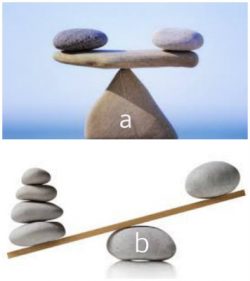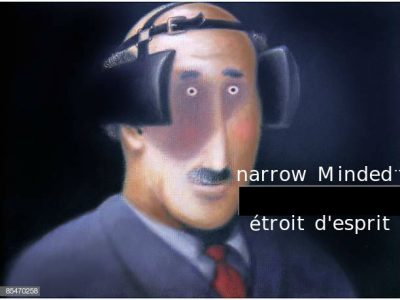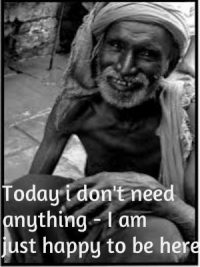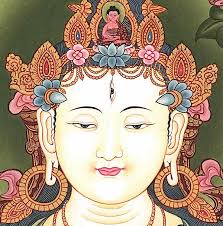Twenty Seven Verses

The 27 Verses on Mind Training have been composed by Lama Je Tsongkhapa (1357 – 1419). This translation is from the book: Mother of All Buddhas by Lex Hixon.
First Verse – infinite garden
With body, speech, and mind fully aligned, I prostrate fervently before those rare beings, who are victorious over all notions of limitation, and before their spiritual daughters and sons. May a cosmic celebration of pure poetry, perfectly expressing the most subtle teaching of these victorious sages and the inheritors of their wisdom, now burst forth like an infinite garden in perpetual spring.
Je Tsongkhapa begins with introducing his family, which he is loving like a fervent lover.
Of course ‘family’ doesn’t necessarily mean his father, mother, siblings and so on – even though they can be part of it; it means his spiritual family which has become much more important than material bonds 😉
And he makes the wish that what he want to tell us may – with the help of his family – be perfectly expressed and burst forth like an infinite garden in eternal spring.
If we join him in the love of his family, we are in on a delicious treat: not only will we perfectly understand, but the understanding will be happening in a splendid garden!
It is very worthwhile to look at the details of his verse: Why is he saying ‘victorious over all limitations’ and not temptations? Why is he mentioning the daughters before the sons?
Second Verse – gaze calmly
Gaze calmly with the clear eye of Prajnaparamita (Perfect Wisdom) upon universal manifestation, this beginningless tapestry woven from vibrant karmic threads of conscious beings, and listen to the harmonious symphony of interdependence. Purify entirely this boundless expanse of apparent struggle and conflict from the slightest shadow of negativity. With diamond-clear intention, instill faith everywhere. With mirror-like wisdom, stabilize all chaotic minds.
 Here is what we understand from the second verse: Je Tsongkhapa proposes an attitude of how to face reality:
Here is what we understand from the second verse: Je Tsongkhapa proposes an attitude of how to face reality:
We could look at any reality with tranquillity.
Tranquillity could come from a clear understanding that all we see does not come at us but from us; nothing that we see exists on it’s own, all is our projection.
If we understand all that each of us sees, comes from each of us; then the whole Universe is a living, harmonious symphony, continuously played by all of us, with no beginning and no end.
Sometimes we may find ourselves in struggle or conflict. Instead of reacting, we could remember our mission, the Universal Principle: We are here to serve and not to be served. The more often we do this, the easier our chaotic minds will stabilize again.
Third Verse – Dispel Negativity
If shadows of negativity are not dispelled immediately, these strange insubstantial absences of light gain immense potency with every new action, until even those who understand the dangers of negation will not have enough power to choose the way of Clear Light. Even those who study philosophy and speak eloquently are unable to release themselves from illusory darkness.
 Here’s what we understand from this verse: there is a very dangerous illusion, dangerous yet not real. Je Tsongkhapa calls them: the shadows of negativity.
Here’s what we understand from this verse: there is a very dangerous illusion, dangerous yet not real. Je Tsongkhapa calls them: the shadows of negativity.
I remember hearing from Buddha the relationship between thoughts and our personality: it all starts with a thought; repetitive thoughts can become a belief, maintained belief can become a habit, the sum of habits become our character or personality. This chain works like a balance: on the thought level the balance is equal (a), we can move the other side as easily as it can move us. We can change thoughts in the same way as thoughts can change us.
If we do not consciously intervene, thoughts will gain weight by becoming beliefs. The other side has become heavier and it takes for us much more effort to change a belief.
When the belief has become a habit the weight disadvantage is still more pronounced; it is very very difficult to change habits.
And finally when beliefs have manifested themselves to form our personality, we have reached the point (b) where the other side outweighs us – it is a sheer impossibility for us to change our personality.
Thoughts can be positive = aligned with our Soul ► giving us happy emotions.
Or thoughts can be negative = resisting our Soul ►giving us negative emotions.
According to our understanding of Je Tsongkhapa, if we do not dispel negative thoughts immediately, we will loose any power to do so very rapidly. Even if we are well learned Buddhists or clever philosophers, we won’t be able to dispel the darkness. Darkness is a good metaphor because it does not exist – it is just the absence of light…
So let’s make a little discipline and remember each time, a negative thought comes to mind – dispel it with a thought about something we like!
4th Verse – What hinders our evolution
The full spectrum of struggling and aspiring humanity, from immature persons to advanced contemplatives, suffers the painful delusion of clinging to these empty shadows as they become filled with affective power by self-centred action and intention.
 Je Tsongkhapa states here that the clinging to negative thoughts is not a casual fallacy, according to him it is something everybody suffers, from the most immature and unconscious person to the most advanced activist or meditator. It’s worse than herpes, because each human being suffers from it.
Je Tsongkhapa states here that the clinging to negative thoughts is not a casual fallacy, according to him it is something everybody suffers, from the most immature and unconscious person to the most advanced activist or meditator. It’s worse than herpes, because each human being suffers from it.
It’s not that we are actively clinging to negative thoughts, but these empty shadows get their life force from another ‘bad habit’ which is self-centred intention and action. Whenever we are not living the Universal Principle – We are here to serve and not to be served – , whenever we pursue our personal, small happiness, we infuse the empty shadows with life. In other words: we cannot abandon negative thoughts while continuing to be selfish.
5th Verse – reactivity
This apparent bondage, this clinging to shadows, is constituted by reactions of pleasure and pain, obviously or subtly rooted in self-serving motivation. By those rare beings who have gone beyond, who throughout all time abide in bliss as Buddhas, the true nature of reactions and their results is clearly known to be insubstantial. But the boundless expanse of self-oriented beings, who bind themselves inexorably to selfish motivation, therefore cannot liberate or even distance themselves slightly from egocentricity.
Je Tsongkhapa goes deeper into the reasons why it is difficult for us to evolve beyond a egocentric life: the fetters which bind us to the ‘clinging shadows’, the negative thoughts are our reactions of pleasure and pain. Instead of simply observing ‘Ah this is so’, we react by investing our energy and emotions in the sense ‘Yes I like it’ or ‘No I don’t like it’. These reactions are possible only while we are following the small happiness, only looking after our small personal good and not following the Universal Principle which aims at the Common Good: We are here to serve and not to be served.
All the enlightened beings, people who have gone beyond the small Me Myself and I , for them reactions are clearly unsubstantial – they don’t matter at all.
So we have to look beyond selfishness, experience the bigger happiness which comes when we are being of service, relaxed and deeply happy.
6th Verse – why do i do this?
We should meditate carefully and thoroughly upon the inevitably binding nature of negativity, learning to discriminate sensitively and unerringly between the actions which negate the preciousness of others and actions which affirm and judiciously care for others. From this clear viewpoint, renounce all negation and strive with the total commitment of your being to become entirely affirmative of all life everywhere.
Now Je Tsongkhapa offers us a solution to escape out of the eternal trap of negativity. He proposes that we could learn to make a difference between
- actions which negate the preciousness of others and
- actions which affirm the caring for others
 In discriminating all our actions intelligently we could develop an inner clarity, to immediately feel if an action that we are about to undertake is caring for others or negating their preciousness. Whenever we have this clear viewpoint, we could just not do the action which negates the preciousness of others and wholeheartedly go for everything that affirms all expressions of LIFE everywhere.
In discriminating all our actions intelligently we could develop an inner clarity, to immediately feel if an action that we are about to undertake is caring for others or negating their preciousness. Whenever we have this clear viewpoint, we could just not do the action which negates the preciousness of others and wholeheartedly go for everything that affirms all expressions of LIFE everywhere.
In other words, Je Tsonkhapa proposes us to put all we do under the Universal Principle: We here to serve and not to be served. We promote only the Well Being of All and do not follow the small well being of our tiny, insignificant ego.
In order to get this clarity, it is a good idea to take the time; to not jump from a motivation or impulse right away to an action. This means cutting an automatism within our selves by asking every time the question: “What I am about to do here; is it a life affirming action, is it a good for All? Or is it just satisfying what I want?”
7th Verse – only the intention
 The seeds of action are positive and negative intentions. Any intention consciously rooted in selfless motivation, desiring only sheer goodness for all conscious life, will establish the stable ground of goodness and will universally generate rich results of goodness. Any intention even slightly weakened by selfish motivation undermines both the ground of our life and its fruits. Intention is the sole creative force of existence.
The seeds of action are positive and negative intentions. Any intention consciously rooted in selfless motivation, desiring only sheer goodness for all conscious life, will establish the stable ground of goodness and will universally generate rich results of goodness. Any intention even slightly weakened by selfish motivation undermines both the ground of our life and its fruits. Intention is the sole creative force of existence.
Today Je Tsongkhapa has a surprise for us: we may have believed that karma means that each of our actions is like a seed that grows in the soil of time to finally sprout into a perception we will have: good seeds give us happy perceptions and bad seeds give us unhappy perceptions.
But now he’s telling us that there are no good or bad deeds – but there are good or bad intentions: a good intention is when what we want to do is motivated by the Universal Principle or the Happiness of All; and a bad intention is motivated by caring about the happiness of only ME.
He goes even so far as to say that whatever we do for the good of All will always and inevitable result in rich results of goodness. But if there is even the slightest trace of selfish motivation, this will undermine both: the basis of our life and the fruits of our actions.
The intention is the ONLY creative force of existence! Can you imagine what this means: the only force that creates in the Universe is our intention!
8th Verse – The Revolutionary Truth
 To cling to the intention of triumphing over another, the desire to prosper at the expense of any being or to indulge in the slightest bias against any being because of personal feelings of attraction or repulsion, these alone are the causes for whatever suffering exists in personal lives and in the universe as a whole. We should meditate ceaselessly on this revolutionary truth, remaining conscious of it during every moment of existence.
To cling to the intention of triumphing over another, the desire to prosper at the expense of any being or to indulge in the slightest bias against any being because of personal feelings of attraction or repulsion, these alone are the causes for whatever suffering exists in personal lives and in the universe as a whole. We should meditate ceaselessly on this revolutionary truth, remaining conscious of it during every moment of existence.
Here’s what Je Tsongkhapa calls The Revolutionary Truth
We have learned from Abraham that the continuous stream of our own thoughts create the reality we are living in. And we have learned form Jé Tsongkhapa in the 7th session how solely important the intention is. Both sources affirm that it is our wish what happens, whether we are conscious of it or not. We can all live in paradise right now, if we do not resist our own wish for it by producing negative thoughts or by unconsciously wanting negative things for others.
This means: if each thought is co-creating our reality, we would want to have only positive thoughts for ourselves and for others. That is easier said than done. I think nobody can pretend being able to completely control his or her thought! So what to do?
Well, according to Je Tsongkhapa, this is a process of ceaseless meditation, of trying to be conscious every moment of our life of what we intend. This process should be soft and compassionate, a series of very little steps, slowly approaching the goal: the more we remember to put our intention inside the frame of the Universal Principle – We are here to serve and not to be served – the more we will remember it. Just keeping this small sadhana, discipline without being too serious about it – no guilt feelings when we didn’t remember – will get us there is a sure and probably imperceptible way 😉
9th Verse – hopelessly narrow minded
 Those who attempt to deceive with words of advice that in any way exalt selfishness and depreciate selflessness become hopelessly lost in narrow-mindedness, obsessed with their own selfish interests. Such persons create the only error in the universe: diverting our precious care and concern for others to ourselves. This deception not only expresses hatred for Buddha’s wisdom but is the absurd attempt to destroy universal Buddha nature.
Those who attempt to deceive with words of advice that in any way exalt selfishness and depreciate selflessness become hopelessly lost in narrow-mindedness, obsessed with their own selfish interests. Such persons create the only error in the universe: diverting our precious care and concern for others to ourselves. This deception not only expresses hatred for Buddha’s wisdom but is the absurd attempt to destroy universal Buddha nature.
There are people – we ourselves sometimes – who apparently are compassionate and give advice to others just to help… but deep down are motivated by self interest – to get an advantage over others, to earn fame or fortune for oneself and so on.
Selflessness and selfishness don’t mix, they are like oil and water. The moment we exalt selfishness, we inevitable depreciate or deny selflessness.
So when we promote selfishness in any shape or form, we create the only error in the Universe – diverting our concern for the precious other to ourselves. Doing so we resist the Universal Principle, we deny how everything works always and only for the Good of All. Denying means we act as if we don’t know – and the Law of Attraction will make us hopelessly lost in narrow-mindedness. When we deny the Universal Principle we barre ourselves from knowing, from understanding.
Our denial of the Universal Principle, however, does not affect the workings of the Universe in any way – only we become intellectually blind, hypnotized and crazy.
10th Verse – our choice
To avoid decisively this disastrous way of hatred, bring to birth within your stream of awareness the maternal mind of totally positive intentions toward all beings as toward cherished children. This mind of kindness, supremely skillful in loving care, unveils the infinite value of every single life, demonstrating compassion as the meaning of existence. But the clumsy negative mind, operating blindly without concern for the preciousness of others, drains the nectar of meaning from human life. Cultivate diligently the selfless love that transforms every thought and action into tangible help for conscious beings.
 We have the choice, according to Je Tsongkhapa, to cultivate a mind (soul of the physicality) which is either supremely skillful or clumsy and negative.
We have the choice, according to Je Tsongkhapa, to cultivate a mind (soul of the physicality) which is either supremely skillful or clumsy and negative.
- If we let the clumsy negative mind have it’s way, we are not acting at all, but all the time reacting blindly without concern of the others. Our life will become meaningless plunged in disastrous vortex of destruction.
- If on the other hand we cultivate the skillful mind of kindness, we will be living a meaningful, infinitely valuable life.
The choice is ours. OK the choice will first be a mental, voluntary decision. We can help this decision to slowly soak through our whole being by seeing all others as our cherished children for whom we do want to selflessly care. In the process everyone of our thoughts will slowly be transformed into a tangible help for all beings.
11th Verse – all beings help us all the time
Such meditative practice brings to light the mind which envisions only the well-being of others, which is constantly grateful to all beloved beings for the immeasurable kindness they have poured forth through beginningless time as mothers, fathers, children, friends, benefactors, and teachers. This mind of goodness knows only the ceaseless longing to benefit all these blessed beings without exception in whatever manner and on whatever level imaginable.
According to Je Tsongkhapa each of us is the creator of his own mind. In the last verse we learned that we can create either a dull mind of selfishness or the intelligent mind of selflessness.
The intelligent mind is in complete synchronicity with the Universal Principle because it sees only the good of All; and it only sees that all beings are immeasurable kind to us because, anything they do to us, is helping us evolve and grow. So we can be constantly grateful for their kindness as our mother, father, benefactor or teacher… and also those who have accepted our teachings, our good deeds and our mothering and fathering. Once in alignment with the Universal Principle, we are a true part of the evolution of the Universe, possessed by the ceaseless longing to benefit All. We are moving in love and we are moved by love.
12th Verse – don’t forget
To remember vividly during every moment the kindness that has been expressed by all beings, and to cultivate an intense and constant longing to return even a small portion of this kindness, unveils the true significance of life in all worlds. The person who fails to respond wholeheartedly to this call for universal kindness and concern is on a lower plane of development than animals, whom are capable of experiencing immense gratitude.

When we are well, we forget, we don’t care anymore. And it’s only when we are in deep insecurity or suffering that we remember kindness, because we need it. When you were for example on a trekking tour and you lost your way, night fell and get completely disoriented and feel lost… if you then see a house in the distance with a light inside, your heart is jumping with joy and gratitude… then you came closer and you see there is even somebody in the house… and this person opens the door for you… and listens to your problem… and even helps you by inviting you in for the night and showing you the way tomorrow… in your situation you will have no problem to see and feel and be grateful for the immense kindness that is shown you.
And this gratitude that you feel creates the urge inside you to return even a small portion of this kindness. This emotional state is a great door, according to Je Tsongkhapa, to reveal the true significance of life to you; if you miss the door, you sink down on a lower plane than animals who are indeed capable of gratitude.
13th Verse – like ice in the sun
The method taught by awakened sages to develop this skillful mind of kindness is to cut the root of all selfish projections by repeatedly and intensively studying Perfect Wisdom, meditating single pointedly on its essence in a state of contemplative stillness and stability. With the clarity and honesty of such concentration, projected worlds of self-serving desire will melt in the sunlight of meditation, like structures of ice, revealing the magnificent secret of our existence, its total significance and absolute justification, which is active compassion for all conscious life.
 During the last chapters, the question naturally arises: how to develop this skillful mind, how to cut the roots of selfishness?
During the last chapters, the question naturally arises: how to develop this skillful mind, how to cut the roots of selfishness?
Je Tsongkhapa proposes to intensely study Perfect Wisdom over and over again. What is Perfect Wisdom? The Buddha shared the Perfect Wisdom with us in his last teaching, called the Heart Sutra: there is nothing in the world that exists on its own; everything exists only in and through our perception. This gives us tremendous power over our reality: it has no reality on its own, it is more like a movie; a movie where the script is written by us and we play the main roles.
We can of course study by reading a book on Perfect Wisdom over and over again, but we can also look at all situations that occur in our lives – especially the nasty ones: see how they make us feel on the spot and then going deeper and seeing how the angry boss is not angry by himself, I perceive him as angry and his wife doesn’t. When I see the emptiness of the boss clearly, my feeling of abuse may disappear – melting away like ice in the sun, revealing a magnificent and splendid existence.
14th Verse – only for Buddhists ?
Those who unhesitatingly embrace and tenderly serve all suffering creatures during this degenerate age, just as a loving mother painstakingly cares for even the most wayward of her children, they alone are the teachers of the holy life who authentically walk the Buddha Way.
 In this verse Je Tsongkhapa lays out the discipline (dharma) for all (Buddhist) practitioners on the path of compassion:
In this verse Je Tsongkhapa lays out the discipline (dharma) for all (Buddhist) practitioners on the path of compassion:
- they recognize that we are living in a degenerate, occult age
- they see all creature as a mother sees her children
- they are always ready to serve all suffering creatures like a loving mother
A note of the editor aviram: if we are not Buddhists, we can still serve all beings to make the world a better place without paying any attention to the current state of affairs, to the manifestations of our current reality. Whenever we see anything we don’t want, we turn our head to look at what is it that we do want and imagine the details of this.
15th Verse – elevate the soul
 The mind that faithfully and tirelessly serves and elevates conscious beings is sheer goodness, constantly giving the gift of itself, its faith in ever-expanding goodness, to all other minds thereby benefiting them in the most direct way. Of all possible forms of benefit on any level, the highest is to teach this practice of love, this indomitable faith in universal goodness, by the direct transmission of selfless awareness flowing transparently from mind to mind in accordance with the need and capacity of each mind. This is true teaching, tangibly transmitting the living energy of universal goodness, which becomes perpetually active in the recipient, even during the most pressing times of crisis, never evaporating into mere words or concepts.
The mind that faithfully and tirelessly serves and elevates conscious beings is sheer goodness, constantly giving the gift of itself, its faith in ever-expanding goodness, to all other minds thereby benefiting them in the most direct way. Of all possible forms of benefit on any level, the highest is to teach this practice of love, this indomitable faith in universal goodness, by the direct transmission of selfless awareness flowing transparently from mind to mind in accordance with the need and capacity of each mind. This is true teaching, tangibly transmitting the living energy of universal goodness, which becomes perpetually active in the recipient, even during the most pressing times of crisis, never evaporating into mere words or concepts.
We could think that goodness is giving money to a beggar. On a very ordinary level that’s OK. But the goodness Je Tsongkhapa is talking about here goes way further: we could cultivate a mind that tirelessly elevates conscious beings. In the example of the beggar that could mean, that we elevate the soul of the beggar so he can change his vibrations from never enough to always abundance. What he calls the ‘direct transmission of selfless awareness’ could be in not seeing the misery of the beggar but the abundance all around him: the sun is shining to warm him, the soft breeze carries wonderful fragrances of flowers, people give him money, a little girl smiles at him… The transmission of these living thought energies becomes perpetually active in the recipient and will help him even in the most severe crises.
16th Verse – we decide on our enlightenment
During this blissful practice, continually cultivating the wonderful, ever-expanding mind of goodness, even the slightest lack of sympathetic joy disappears and awareness becomes more concentrated and selfless, while the selfish emotions and conceptual projections which compose this narrow conventional world are gradually effaced, and we are completely liberated. The brilliant sun of Great Compassion shines unobstructed. The spirit of wholehearted love in every thought and action constitutes the spontaneously radiating sunlight, effortlessly melting the mist of self-centeredness, vastly strengthening our constant efforts for all beings.
In this verse Je Tsongkhapa gives us the mechanism of what happens to our mind and to our life when we cultivate goodness in whatever we do: even the slightest lack of sympathetic joy will disappear leaving the whole space for expanding awareness leading us to complete liberation. With our narrow selfish personality completely gone, only the brilliant sun of compassion will shine unobstructed. And even this sun is ‘made’ of the intention of wholehearted love in every one of our thoughts, words or actions.
This suggests that we are not only responsible for the creation of the reality surrounding us – paradise or hell, so to say -, but we also have the decision for our own enlightenment. According to Je Tsongkhapa, we all would be already enlightened – if it wasn’t for our selfish intentions that prevent enlightenment. And the way towards paradise and enlightenment is self gratifying: each step in the right direction makes us feel good, each step in the opposite direction makes feel suffering – this is an unfailing inner GPS on our spiritual path!